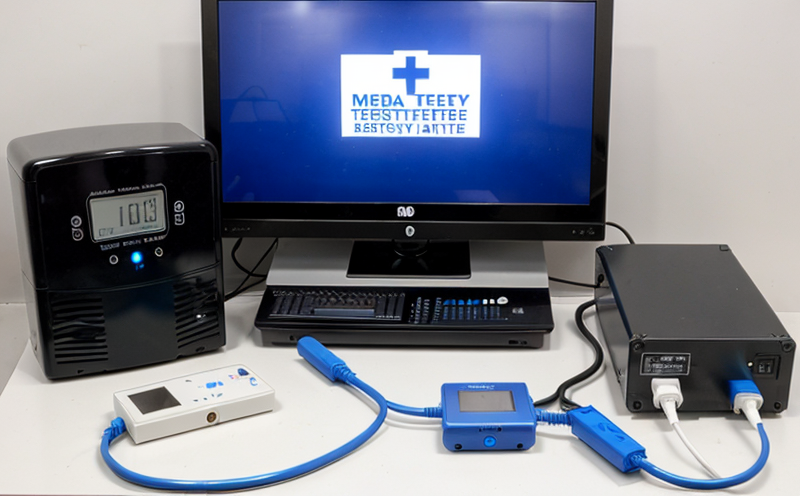IEEE 11073 Medical Device System Battery Testing
The IEEE P11073 project aims to standardize medical device communication and interoperability, ensuring that devices from different manufacturers can communicate effectively. As part of this initiative, the IEEE 11073-20601 standard specifies protocols for battery testing in implantable medical devices (IMDs) and wearable medical devices (WMDs). This service ensures that batteries within these devices meet stringent performance criteria, thereby enhancing patient safety and device reliability.
Battery performance is critical to the proper functioning of medical devices. In IMDs and WMDs, a compromised battery can lead to loss of functionality or even life-threatening situations. IEEE 11073-20601 provides a framework for ensuring that batteries in these devices are robust enough to meet the demands placed on them by the device's operational requirements.
The standard covers various aspects of battery testing, including:
- Testing protocols
- Data formats and structures
- Error handling mechanisms
- Security measures for data transmission
Battery testing under IEEE 11073 ensures that devices can communicate effectively with external systems such as monitoring devices, patient management systems, and healthcare providers. This communication is vital for real-time monitoring of the device's battery status, thereby enabling timely interventions.
Our service focuses on providing comprehensive battery testing services that adhere to IEEE 11073-20601 standards. We employ state-of-the-art equipment and expertise to ensure that your medical devices meet the highest standards for safety and reliability. Our team of experts will work closely with you to understand your specific requirements, ensuring that our tests are tailored to your device's unique specifications.
Our battery testing services include:
- Comprehensive battery performance evaluation
- Data analysis and reporting
- Identification of potential issues in the battery design
- Suggestions for improvements based on test results
- Validation of compliance with IEEE 11073-20601 standards
- Support for regulatory submissions
We ensure that your devices meet not only the IEEE 11073-20601 standard but also other relevant international standards such as IEC 60601 and ISO standards. This ensures that your products are ready for global markets.
Our service is designed to help you achieve compliance with regulatory requirements, ensuring that your devices meet the highest safety and performance standards. By providing robust battery testing services, we aim to enhance patient safety and improve the reliability of medical devices.
Scope and Methodology
| Test Parameter | Description | Acceptance Criteria |
|---|---|---|
| Battery Voltage | The battery voltage is measured at specified intervals during the test. | Voltage should remain within the device's operational range as defined by IEEE 11073-20601. |
| Battery Capacity | Initial and final capacity are measured to ensure that the battery meets the required discharge performance. | Capacity must meet or exceed the specified value in the device's technical specifications. |
| Battery Discharge Time | The time taken for the battery to reach a predefined low voltage threshold is recorded and analyzed. | Discharge time should not exceed the maximum allowed by IEEE 11073-20601 standards. |
| Battery Temperature | The temperature of the battery during testing is monitored to ensure that it remains within safe operating limits. | Temperature must remain within the specified range for the device as per IEEE 11073-20601. |
| Data Transmission | Battery data is transmitted to a monitoring system to verify compliance with IEEE 11073-20601 protocols. | Data transmission must be successful and accurate as per the standard's requirements. |
The methodology for testing under IEEE 11073 is rigorous and comprehensive, ensuring that all aspects of battery performance are thoroughly evaluated. Our team of experts will work closely with you to ensure that your devices meet all the necessary criteria for compliance with the standard.
Industry Applications
- Implantable Medical Devices (IMDs)
- Wearable Medical Devices (WMDs)
- Remote Monitoring Systems
- Patient Management Systems
- Home Health Care Solutions
Battery testing under IEEE 11073 is particularly important for IMDs and WMDs, where battery performance can directly impact patient safety. For example, in IMDs like pacemakers or implantable cardioverter-defibrillators (ICDs), a compromised battery could lead to life-threatening situations such as device failure during critical moments.
In WMDs, such as smartwatches designed for health monitoring, the battery is crucial for ensuring that the device can provide real-time data to healthcare providers. Any issues with the battery could result in delayed or inaccurate data transmission, which could be detrimental to patient care.
Beyond just the medical devices themselves, IEEE 11073-20601 also ensures effective communication between these devices and external systems such as monitoring devices and patient management systems. This interoperability is essential for remote monitoring of patients, enabling healthcare providers to make timely interventions when necessary.
Our battery testing services are designed to support the full range of applications in this sector, ensuring that your products meet the highest standards for safety and reliability.
Eurolab Advantages
- Expertise: Our team of experts has extensive experience in medical device testing, ensuring that your devices meet all necessary standards.
- Comprehensive Services: We offer a full suite of services to support your product development and compliance needs.
- State-of-the-Art Equipment: We use the latest technology to ensure accurate and reliable test results.
- Dedicated Support: Our team will work closely with you to understand your specific requirements, ensuring that our tests are tailored to your device's unique specifications.
- Regulatory Compliance: We help you achieve compliance with international standards such as IEEE 11073-20601 and other relevant regulations.
- Quality Assurance: Our services are designed to enhance the quality and reliability of your medical devices, ensuring patient safety.
We pride ourselves on providing exceptional service and support throughout the testing process. Our goal is to help you achieve compliance with regulatory requirements while also enhancing the performance and reliability of your products.





